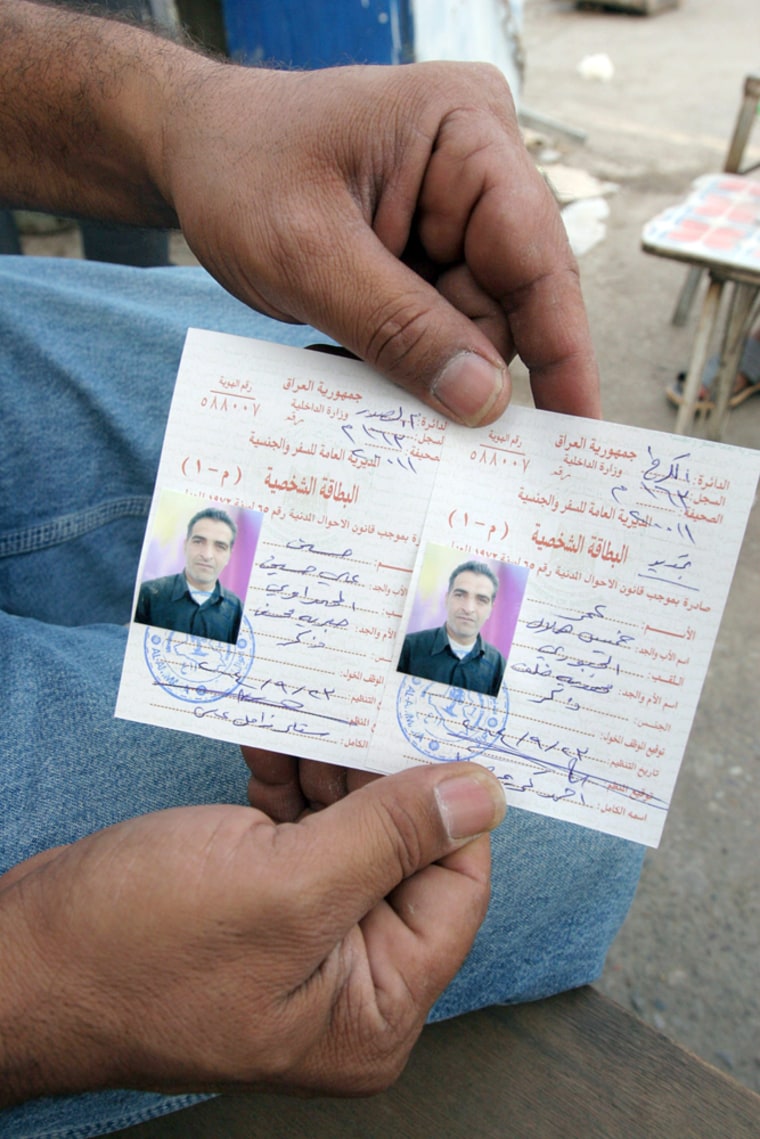A bookstore in eastern Baghdad is getting more customers these days, but they aren’t looking for something to read. The owner sells fake IDs, a booming business as Iraqis try to hide their identities in hopes of staying alive.
Although it’s nearly impossible to distinguish between a Sunni and a Shiite by sight, names can be telling. Surnames refer to tribe and clan, while first names are often chosen to honor historical figures revered by one sect but sometimes despised by the other.
For about $35, someone with a common Sunni name like Omar could become Abdul-Mahdi, a Shiite name that might provide safe passage through dangerous areas.
“I got a fake ID card to protect myself from the Shiite militias who are deploying in Baghdad and hunt Sunnis at fake checkpoints,” said Omar Abdul Rahman, a 22-year-old university student. He refused to give the name on his fake ID.
The growing use of fake IDs reflects the spike in violence between Sunnis and Shiites since the Feb. 22 bombing of a revered Shiite mosque in Samarra — an attack that triggered reprisal killings of Sunnis and pushed the country to the brink of civil war.
Interior Ministry Maj. Gen. Mahdi al-Gharawi said officials are aware fake IDs are common but have more important things to focus on — such as stopping violence.
‘It's illegal, but one can understand’
“They are issuing Sunni IDs in the Shiite areas and vice versa,” he said. “It’s illegal, but one can understand why they do it.”
The problem was thrust into the spotlight Sunday when masked Shiite gunmen ambushed Sunnis in western Baghdad, singling out those with names commonly used by Sunnis to be killed.
Wissam Mohammad al-Ani, a 27-year-old Sunni calligrapher, said his false identification card has a Shiite name and it saved his life when he was approached by gunmen.
“When they saw it, they let me go,” he said, adding that two young men standing with him at a bus stop in the Jihad neighborhood were seized.
Shiites are the majority in Iraq, but some Shiites also seek alternate identities to avoid attacks by Sunni-led insurgents.
Just last month, masked gunmen stopped two minivans carrying students northeast of Baghdad, ordered the passengers off, separated Shiites from Sunni Arabs, and killed the 21 Shiites “in the name of Islam,” a witness said.
Low tech and available
Making fake IDs is relatively low-tech, and vendors can be found in empty houses and in alleys.
The bookstore owner, whose shop is in a predominantly Shiite neighborhood and declined to give his name for fear of reprisals, said he buys blank IDs from print shops. He then fills in the desired information and adds photos — a process known in the Baghdad street as “the change.”
Most of his customers are Shiite drivers and construction workers planning to work in Sunni neighborhoods, with prices ranging from 5,000 Iraq dinars ($3.50) for a card that looks like one issued during Saddam Hussein’s regime to 50,000 Iraqi dinars ($35) for a modern version.
Shiite militiamen, who are widely blamed for much of the sectarian violence, allow him to operate because he agreed to turn in any Sunnis who wander into his store.
He said the ID business spiked after the bombing in Samarra.
“Nobody did the change from Shiite to Sunni before that, when the real sectarian tension began,” he said.
What's in a name?
Sunni and Shiite names often can easily be distinguished in Iraq by tribe or clan, or because they refer to followers of Muhammad who split over who should lead Islam after the prophet died in the 7th century. Residential areas also can be telling as they are increasingly segregated, with residents fleeing sectarian attacks.
Sunni names include Abu Bakr, Omar or Othman, who are particularly reviled by Shiite extremists who perceive them as having usurped power from Imam Ali, the prophet’s cousin and the Shiites most revered saint. Typically Shiite names are Abdul Zahra and Moussawi.
Sufyan Mahmoud, a 36-year-old Sunni grocer named for Abu Sufyan — the pre-Islamic ruler of Mecca whose descendants opposed Imam Ali — paid $30 for false papers with the neutral Arabic name of Mohammed Ahmed Mahmoud.
Some Iraqis recall having false identification papers to avoid persecution during Saddam’s rule, but the practice was rare until recently because the former regime kept tight control over its subjects.
“Under Saddam it used to be shameful, but now everybody’s doing it,” the bookseller said.
A newspaper commentator mockingly suggested Iraqis should turn to the Bible instead of Islam to find names for their children.
“According to the present sectarian concepts, fathers should choose ’neutral names’ such as Jesus, Adam, or Abraham that have nothing to do with the two sectarian camps,” Sabah al-Lami wrote in the independent al-Mashriq newspaper.
